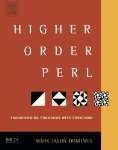
Who are you, and what do you do?
I am a computer programmer.
I am often identified with Perl, but I consider myself a generalist.
I wrote a book called Higher-Order Perl, which is an example of this: I read a lot of books about languages like Lisp, ML, and Haskell, and learned techniques from those languages. Then I tried to apply the same techniques in Perl instead. Some of the techniques didn't work, or didn't make sense, but others did work, and most Perl programmers didn't know them, so it was a useful book.
I am also an amateur mathematician of a very low order, and I write a very eclectic blog at http://blog.plover.com/.
What books have influenced you the most?
The book that always comes to mind is The Crazy Ape by Albert Szent-Györgyi. Szent-Györgyi won the Nobel Prize in 1937 for discovering ascorbic acid. The Crazy Ape was written in 1970, and is addressed to the youth of 1970, mostly about war and about the duty of the young to avoid the wars that the old would try to foist on them.
I read the book when I was fourteen, and one passage in particular struck me and has remained with me ever since:
When I received the Nobel Prize, the only big lump sum of money I have ever seen, I had to do something with it. The easiest way to drop this hot potato was to invest it, to buy shares. I knew that World War II was coming and I was afraid that if I had shares which rise in case of war, I would wish for war. So I asked my agent to buy shares which go down in the event of war. This he did. I lost my money and saved my soul.
This idea that one must have a personal morality, and remain faithful to it no matter the cost, is one that has been with me all my life.
What book would you like to write?
For most of my life I've dreamed of writing a book called "Quipus and Abacuses" about digital information processing before electronic digital computers were constructed. People often ask how the Romans built all those bridges when they had to calculate with Roman numerals, which are ill-suited to the task. The answer is that they used Roman numerals only for data storage, but when they had to calculate, they used an abacus, which is a low-order kind of digital computer. But how many people actually know how an abacus works?
So I want to write about pre-electronic calculation methods: abacuses, pencil-and-paper algorithms, Napier's bones, mechanical adding machines, and so on. I want to write about pre-electronic data storage: written records, but also quipus (a system of knotted strings used by the Incas), the notched sticks used by the British Exchecquer until the 19th Century, and so on. And if you keep a lot of records you have to organize them somehow so that you can find the ones you want, so I will discuss the (gradual!) invention of alphabetization and alphabetical indices, and the methods used to organize Chinese dictionaries and movable types, and things like that. Ultimately this might go back to the invention of writing, which some people think started out as a system of clay tokens that served as receipts for goods exchanged.

